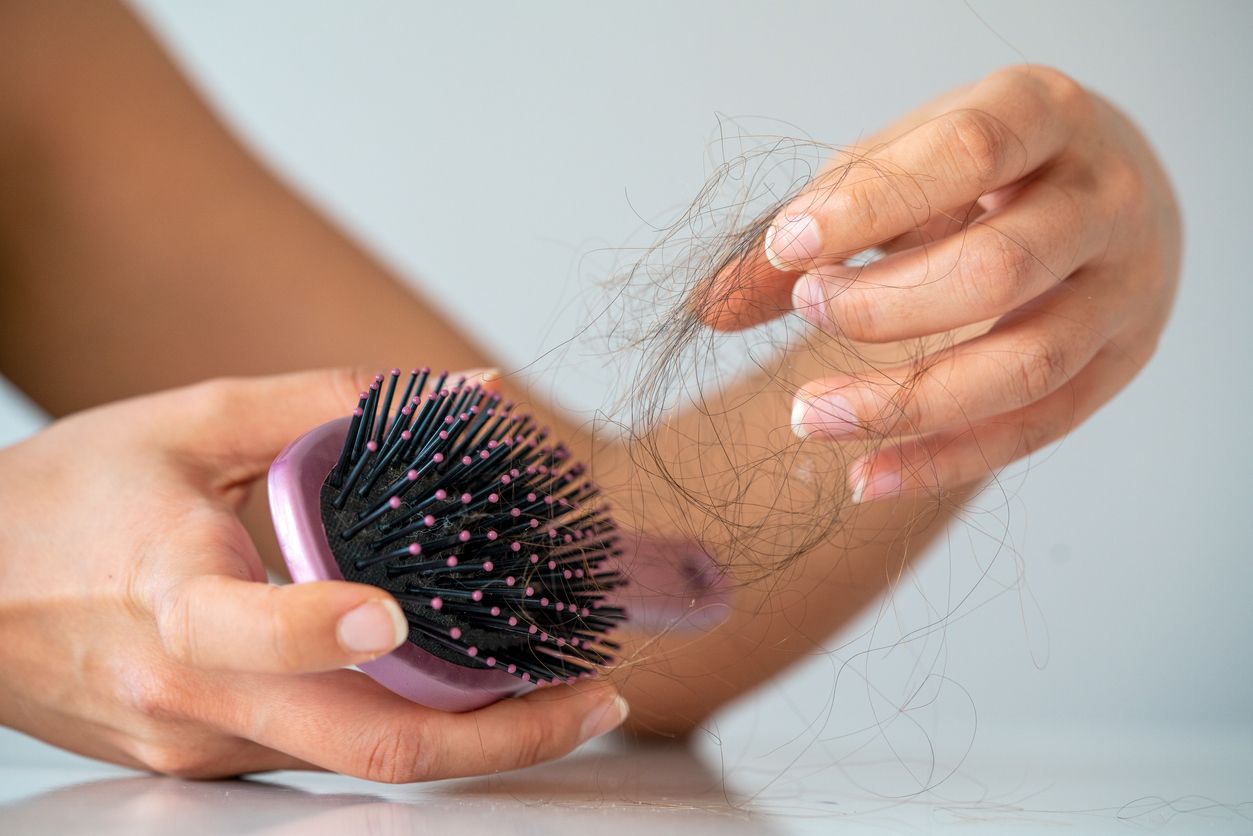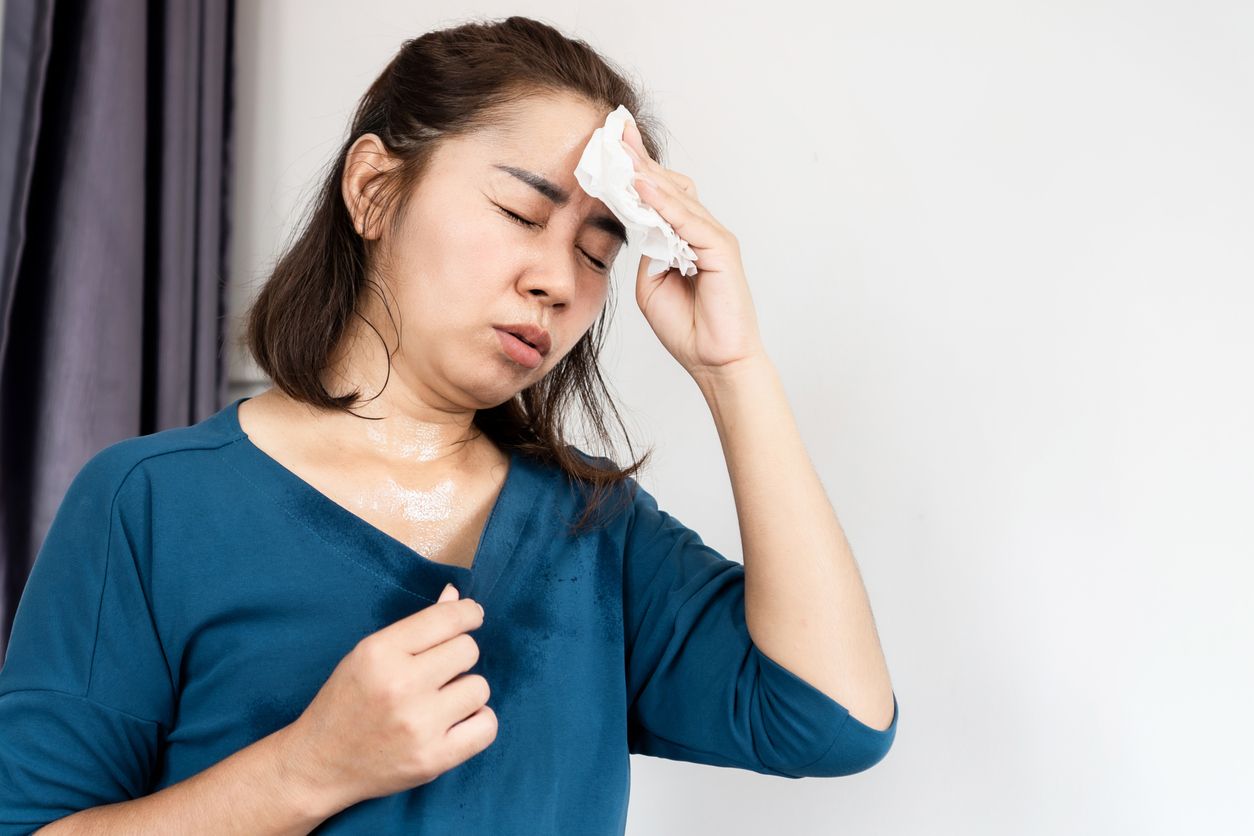
- Home
- Trend
- Weight Loss Strategies
- Acne Tips
- Hair Health Information
- Blemish Removal Tips
- Acne Scar Removal Tips
- Muscle Building Techniques
- Intimate Care Tips
- Postpartum Intimate Care
- Eye Bags Wiki
- Tips for Face Slimming
- Secret of Permanent Hair Removal
- Breast Enlargement Tips
- Cure to Snoring
- Marionette Lines
- Skin-Tightening Secrets
Menopausal hair loss is a common concern among women today, mainly caused by a sharp decline in estrogen and progesterone levels. As hormonal changes during menopause differ drastically from earlier stages of life, the body struggles to adapt, leading to abnormal hair shedding. When women enter menopause, the drop in female hormones allows male hormones to dominate, triggering the production of DHT—a hormone that attacks hair follicles, causing them to shrink and close off. This disrupts the process of keratin production, leading to increasingly severe hair loss.
But don’t panic if you notice signs of menopausal hair loss—it’s not too late! In this article, we’ll break down 4 common causes of menopausal hair loss in women and introduce 3 professional hair regrowth treatments. Stick around to the end for a surprise!
Main Causes of Menopausal Hair Loss: The 4 Key Factors

Cause 1: Aging
Menopause typically occurs between ages 45 and 55. As women age, their physiological functions begin to change—especially ovarian function, which leads to a sharp decrease in estrogen and progesterone levels. Once these hormone levels drop, hair follicles enter the “resting phase” early, causing hair to fall out more easily, become brittle, and grow more slowly. Additionally, the aging process itself lowers follicle activity and regenerative ability, making hair thinner and weaker over time.
Other age-related physical changes, like a slower metabolism, reduced nutrient absorption, and unstable immune function, can also impact scalp and follicle health, worsening hair loss.
Cause 2: Genetics
Genetics can affect hair follicle distribution and growth cycles. Some women may naturally have weaker follicles that cannot withstand the hormonal and age-related changes of menopause, making hair loss more prominent. When hormone levels drop, these already fragile follicles struggle to cope, accelerating hair loss. Although hair thinning during menopause is a normal process, genetics can intensify the problem—many women find their hair loss more severe than others in their family.
Cause 3: Psychological Stress
Long-term stress disrupts hormonal balance, indirectly intensifying hair loss. Emotional stress affects hormone production, and when combined with insomnia, the body misses the prime time for metabolic recovery. This can lead to a hormonal imbalance, with male hormones attacking the follicles—just like in earlier causes—worsening hair loss symptoms.
Cause 4: Nutritional Deficiencies
Poor nutrition is another key reason for hair loss during menopause. Lacking vital nutrients such as vitamins A, B-complex, and C, iron, zinc, protein, and other minerals can result in thinning hair. These nutrients are essential for the production of keratin and collagen—key components for strong, healthy hair. Without them, hair becomes weaker, and growth slows down or stops altogether.
How to Diagnose Menopausal Hair Loss: Seek Help If You Notice These Symptoms

Common signs of menopausal hair loss include:
• Thinning around the crown and hairline
• Finer, more brittle strands
• Slower hair growth
• Noticeably more shedding during combing or washing
• Increasingly visible scalp, with a possible “M-shaped” hairline
Before consulting a professional, you can get familiar with the typical diagnosis process:
• Medical History Review: Includes family history, medications, and lifestyle habits
• Physical Examination: Doctors will assess your scalp, hair quality, and areas of thinning
• Lab Tests:
- Blood tests: To check hormone levels, ferritin, and vitamin D
- Hair microscopy: To examine follicle health
Once menopausal hair loss is confirmed, doctors often recommend a combination of topical and oral medications to stimulate hair growth.
免費體驗
F8 Hair Regrowth Treatment
1 Minute Self-Registration
Date should not be before minimal date
Treatment Options: Do Hair Regrowth Treatments Work?
Medications
• Topical:
Minoxidil – Stimulates follicles and extends the growth phase. Must be used consistently; potential side effects include itching or mild scalp redness.
• Oral:
Selective Estrogen Receptor Modulators (SERMs) – Help regulate hormone levels
Anti-androgens (e.g., Spironolactone) – Target hair loss caused by excess male hormones
Oral medications carry risks and must be prescribed by a physician. While hormone therapy can alleviate menopausal symptoms including hair loss, it may increase the risk of breast cancer or stroke, and should be carefully evaluated.
Non-medication Treatments
• Low-Level Laser Therapy (LLLT): Enhances scalp circulation and stimulates follicles. Non-invasive and relatively safe.
• PRP (Platelet-Rich Plasma) Injections: Uses your own blood to stimulate follicle regeneration.
• Hair Transplant Surgery: Transfers healthy follicles to thinning areas. Long-lasting but costly.
6 Daily Tips to Prevent Hair Loss and Maintain Scalp Health
• Balanced Nutrition: Ensure enough intake of protein, iron, zinc, and vitamins
• Regular Exercise: Sweating boosts metabolism and may slow aging-related hair loss
• Stress Management: Practice meditation, deep breathing, and maintain regular sleep
• Gentle Haircare Habits: Avoid frequent dyeing or perming; reduce styling product use
• Scalp Massage: Promotes circulation and nutrient absorption for follicles
• Routine Checkups: If you have hair loss concerns, monitor hormones and follicle health regularly
The Ultimate Solution for Menopausal Hair Loss: Perfect Medical F8 Hair Regrowth Treatment
Menopause doesn’t just take away youth—it also takes your once-lush hair! But the good news is, reversing menopausal hair loss isn’t as hard as it seems. The Perfect Medical F8 Hair Regrowth Treatment is here to save the day!
Perfect for women, this non-invasive, pain-free treatment is beginner-friendly. It uses medical-grade soft laser technology that penetrates the scalp to extend the active growth phase of hair while reducing hair shedding during the resting phase. The visible results include stronger hair and improved regrowth.
Whether you’re facing general thinning, a receding hairline, telogen effluvium, seborrheic hair loss, postpartum shedding, or stress-related loss, the F8 Treatment is your way to break free from the cycle!
Register now to enjoy: Professional scalp analysis + Perfect Medical F8 Hair Regrowth Treatment!
Register Today: Perfect Medical F8 Hair Regrowth Treatment免費體驗
F8 Hair Regrowth Treatment
1 Minute Self-Registration
Date should not be before minimal date
FAQ

Why does menopause affect hair growth?
There are many possible reasons—stress, insomnia, or poor nutrition—but the main cause is hormonal imbalance.
How do I know if I’m experiencing menopausal hair loss?
After reaching middle age, observe areas like the forehead and crown for thinning or bald spots.
Will my hair grow back after menopause?
Yes, but at a slower pace than before. The wait may result in prolonged periods of visible hair loss, causing appearance-related anxiety.
What are the treatment options for menopausal hair loss?
Common treatments include topical medications, oral prescriptions, and surgical procedures like hair transplants. These require consistent, long-term commitment for noticeable results.
What is the main cause of menopausal hair loss?
Hormonal imbalance after menopause leads to an increase in androgens, which shrink and close hair follicles, making new hair growth difficult.








